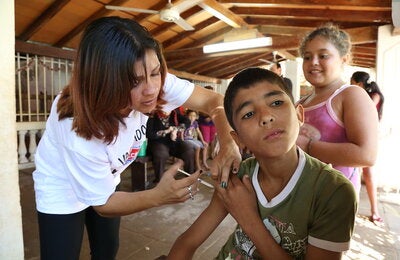Geneva/Washington D.C., World Health Day 2017 (WHO/PAHO). - Depression is the leading cause of ill health and disability worldwide. According to the latest estimates from the World Health Organization (WHO), more than 300 million people are now living with depression, an increase of more than 18% between 2005 and 2015. Lack of support for people with mental disorders, coupled with a fear of stigma, prevent many from accessing the treatment they need to live healthy, productive lives.
The new estimates have been released in the lead-up to World Health Day on 7 April, the high point in WHO's year-long campaign "Depression: let's talk". The overall goal of the campaign is that more people with depression, everywhere in the world, both seek and get help.
"These new figures are a wake-up call for all countries to re-think their approaches to mental health and to treat it with the urgency that it deserves," said WHO Director-General, Dr. Margaret Chan.
In the Americas, nearly 50 million people were living with depression in 2015, about 5% of the population. "Depression affects us all. It does not discriminate by age, race or background. It can hurt relationships, interfere with people's ability to earn a living, and lower their sense of self-worth," said PAHO Director Carissa F. Etienne. However, "even the most severe depression can be overcome with proper treatment. And the first step to getting treatment is to talk," she added.
"The continuing stigma associated with mental illness was the reason why we decided to name our campaign Depression: let's talk," said Dr Shekhar Saxena, Director of the Department of Mental Health and Substance Abuse at WHO.
Increased investment is also needed. In many countries, there is no, or very little, support available for people with mental health disorders. Even in high-income countries, nearly 50% of people with depression do not get treatment. On average, just 3% of government health budgets is invested in mental health, varying from less than 1% in low-income countries to 5% in high-income countries.
In the Americas, nearly 7 out of 10 people with depression don't get the treatment they need. "We must act now to close the gaps that separate people with mental conditions from the health services they need", said Dévora Kestel, Chief of PAHO/WHO's Mental Health and Substance Abuse unit.
WHO has identified strong links between depression and other noncommunicable disorders and diseases. Depression increases the risk of substance use disorders and of diseases such as diabetes and heart disease; the opposite is also true, meaning that people with these other conditions have a higher risk of depression. Depression is also an important risk factor for suicide, which claims hundreds of thousands of lives each year.
"A better understanding of depression and how it can be treated, while essential, is just the beginning. What needs to follow is sustained scale-up of mental health services accessible to everyone, even the most remote populations in the world," said Dr. Saxena.



